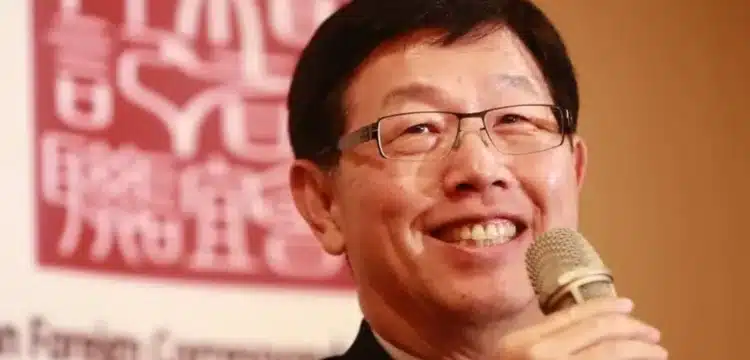[vc_row][vc_column][vc_column_text dp_text_size=”size-4″]As it navigates a new era of chilly Washington-Beijing ties, iPhone maker Foxconn is spending big on electric automobiles and redrawing some of its supply networks.
Chairman and CEO Young Liu told the BBC in an exclusive interview what the future may hold for the Taiwanese company.
Even as Foxconn switches some supply chains away from China, he believes electric vehicles (EVs) will fuel the company’s growth in the next decades.
Mr Liu stated that as US-China relations rise, Foxconn must brace for the worst.
“We hope that the leaders of these two countries will keep peace and stability in mind,” Mr Liu, 67, said us in his office in Taipei, Taiwan’s capital.
“However, as a business, as a CEO, I have to consider what if the worst case scenario occurs?”
Possible scenarios include Beijing attempting to blockade Taiwan, which it claims as part of China, or worse, invading the self-ruled island.
Mr Liu stated that “business continuity planning” was already underway, and that some production lines, notably those associated with “national security products,” were already being relocated from China to Mexico and Vietnam.
He was most likely talking to Foxconn servers, which are utilised in data centres and can store sensitive information.
Also Read: Two strangers met on the River Nile. They’ve been married for 25 years
Foxconn, or Hon Hai Technology Group as it is formally known, began in 1974, manufacturing knobs for televisions. With an annual revenue of $200 billion (£158.2 billion), it is now one of the world’s most powerful technology businesses.
It is most known for producing more than half of Apple’s devices, from iPhones to iMacs, but it also works with Microsoft, Sony, Dell, and Amazon.
It has thrived for decades on a script developed by global corporations: they design items in the US, make them in China, and then sell them around the world. That is how it evolved from a tiny component manufacturer to the consumer electronics behemoth it is today.
However, as global supply networks react to deteriorating ties between Washington and Beijing, Foxconn finds itself in an unfortunate position: sandwiched between the world’s two largest economies, the exact countries that have propelled its rise up to this point.
The United States and China are at odds over a variety of issues, including trade and the Ukraine conflict. However, one of the most likely flashpoints is Taiwan, where Foxconn is located.
Caught in the crossfire
Taiwan has long been a contentious issue, but Chinese President Xi Jinping’s repeated threats of “reunification” have upended the uneasy status quo. Meanwhile, the US has been more public in its support for Taiwan in the event of an attack under President Joe Biden.
Although the White House has emphasised that it retains diplomatic relations with Beijing rather than Taipei, certain US voices have violated China’s red line, pushing for independence.
With US Secretary of State Antony Blinken visiting China this weekend, there is hope for a thaw. But there are also concerns about a conflict, which one US general believes may occur within the next two years.
“The United States and China are engaged in what we see as strategic competition,” said Shihoko Goto, the Wilson Center’s deputy director for the Asia programme in Washington, DC.
“Foxconn wants to do business with both, but there can be only one winner.”
Mr Liu, on the other hand, does not believe it is that straightforward. For one thing, he claims that Foxconn’s business model, which is based on US designs and Chinese manufacturing, is far from dead.
“We hire a lot of workers, and most countries, including China, want to support their workers,” Mr Liu explained, adding that the Chinese government wants companies like Foxconn to continue operating due to the large number of jobs they create.

Is the model under threat from escalating tensions? “So far? “We haven’t seen it,” he said.
However, the West and its allies have urged governments and businesses to “de-risk” from China, a long-term transition to reduce global reliance on China that has yet to take effect.
When asked if this was having an effect on business, Mr Liu reacted hesitantly.
Some outside customers had urged Foxconn to relocate production out of China, he claimed, but it was their decision, not Foxconn’s.
“They’ll let us know once they get the push from their government to de-risk.”
Aside from geopolitics, Covid-19 is another reason corporations may contemplate “de-risking” from China.
Protests and rioting broke out in late 2022 at Foxconn’s factory in Zhengzhou, the world’s largest iPhone plant, due to a combination of strict Covid policies, a lack of quarantine space, and the infectiousness of the Omicron variety. Hundreds of workers fled the campus on foot, fearing the virus’s spread.
Mr Liu stated that the spectacles seen by the globe were caused by a paucity of vehicles because to Beijing’s unwavering zero-Covid policy
When questioned further, he agreed that he should have handled the situation better.
“If the same situation arises again, I would stop production entirely,” he added, adding that he would have made that decision even if it meant upsetting clients like Apple.
The company’s success is undoubtedly based on its remarkable clientele, but Foxconn is as important to those clients.
To understand how important it is to Apple, consider how much of the iPhone is manufactured by Foxconn – approximately 60%, according to some estimates. Some of the most important components of the gadget are manufactured in China, including camera modules, connections, and even the rear of the phone case.
iPhone on the move
Mr Liu hopes that this expertise will fuel Foxconn’s next big bet: electric cars.
“Look at this – this is a big iPhone, so we’re very familiar with this,” he remarked, pointing to a panel that controlled the car he had driven us in.
The gleaming white SUV, designed for families and priced for the aspirant global middle class, is one of numerous models produced by Foxconn.
“The reason we believe this is a great opportunity for us is that traditional petrol engines have mostly mechanical engines.” “With EVs, however, it’s batteries and motors,” he continues.
That is a language that a technological corporation like Foxconn is comfortable with, he noted.
Foxconn intends to grab around 5% of the worldwide electric car market in the next few years, an ambitious goal given the company’s limited product line. However, Mr Liu is optimistic that the gamble will pay off.
“It doesn’t make sense for you to make [EVs] in one place, so regionalised production for cars is very natural,” he continued. According to him, Foxconn automobile plants will be located in Ohio, Thailand, Indonesia, and possibly India.
For the time being, the company will continue to focus on what it does best: creating electronic products for customers. However, Foxconn may start selling its own cars in the not-too-distant future.
In any case, by venturing into electric vehicles, Foxconn is diversifying not only its manufacturing but also its supply lines, both of which Mr Liu feels hold the key to the company’s future.
[/vc_column_text][/vc_column][/vc_row]











